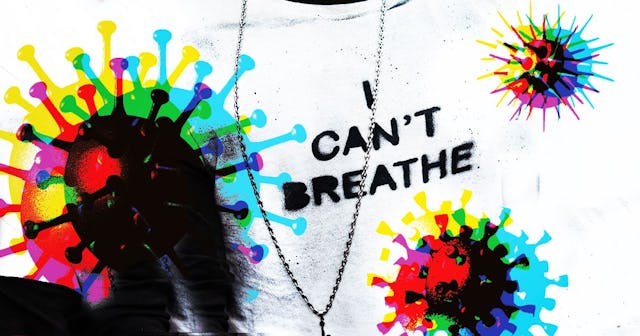We're Living In The Year Of 'I Can't Breathe'

We’ve heard about the shortage of ventilators available to help hospitalized victims of the coronavirus. We’ve heard about the people in ICU beds, flipped over, their faces looking at the floor struggling to breathe, clutching onto life, unsure of what the future will hold, unable to have a family by their side as they approach death’s door.
We’ve heard the calls from Eric Garner to George Floyd, pleading as they died, “I can’t breathe” — words that would drive a movement and bring an entire nation to its knees. They too died alone without family around, unexpectedly, not ready to go. By their side were strangers, similar to the victims of coronavirus who had nurses and doctors supporting them during their final moments.
We are living in the Year of “I Can’t Breathe,” and we are all suffocating.
In the days and weeks ahead, we will soon be looking ahead to 2021, reflecting on 2020, and asking ourselves the question so many of us ask the night of December 31st — how will I do better this year? We can hope, certainly, that 2021 will give us what 2020 did not — peace. In five short months, we will be there: reflecting and dreaming about what lies ahead. For now, we must make it, literally and figuratively to 2021. We are all, in every way, fighting for our lives.
While the pandemic has gripped our attention on the nightly news, and the reopening plans of states across the country (and now, those of schools) have left us with more questions than answers, we now also grapple with indecision. Do we send our kids back to school? Do we go back to our office? Do we send our kids to daycare? The “what ifs” of our current lives can be paralyzing.
Every single part of our lives, of our humanity, is impacted by this one virus. Our commute into the office is stalled as we continue to navigate the work from home situations -0 as stressful as some of them maybe. Our children’s summer plans have taken a permanent detour and our family summer vacations are now a reinvented staycation. Some of us may have dealt with positive COVID-19 test results ourselves, or missed the window to get tested and still may be dealing with symptoms from COVID-19 after our negative antibody test. We are trying to figure out how to inhale and exhale in a way that gives us the freedom we long for: void of multi-tasking or making another snack or attending yet another Zoom meeting or going grocery shopping or remembering to bring our face mask with us wherever we go. I can’t breathe.
Lisa Maree Williams/Getty
We have family, friends, and neighbors battling the coronavirus. Maybe they have or had it themselves. Maybe they are holed up in their homes, waiting it out and hoping they are never infected. Maybe they are mourning the loss of a loved one who didn’t make it to the other side of their COVID-19 fight, never to return home again. Staying away from grandparents and elderly family and friends to keep them safe. Maybe they are part of the army of frontline workers risking their lives every day in an attempt to save someone else’s. A nagging cough appears, a slight fever, lethargy, and the telltale symptom of not being able to breathe. We hear our neighbors, family, and friends struggling to make sense of it all while figuring out what this new normal might be like — masks and all.
We have Black people across the country grappling with how to manage the emotions associated with the loss of someone we did not know — the Eric Garners, the George Floyds of our time, their deaths reminders of a long-fought struggle to breathe in a world our ancestors helped to build. We wear t-shirts saying “I can’t breathe.”
As a country, as parents, we are revisiting what our history books taught us. We are questioning parts of what we thought to be true and finding new ways to understand this land of the free, home of the brave. We think about “I can’t breathe” in hopes of finding a resolve or a better police response when someone speaks these three words. When we can’t, we turn to our family, friends, and neighbors even to help us once again make sense of the senseless. How does it feel to die alone, accused of a crime, and sentenced before you’re even arrested? How does it feel to be strangled, suffocating by the hands of someone else, struggling to breathe and lay dead on the pavement?
We are being brought to our knees by the Year of I Can’t Breathe, some of us to our deathbeds, all struggling to figure out if or how or when we will be able to breathe a little easier. Maybe it will be when the kids return to school. Maybe it will be when we finally have a vaccine for the coronavirus. Maybe it will be when we have a collective understanding and support of the Black Lives Matter movement. Maybe it’ll be when we have a new president in the White House who values the life of every American.
We must continue to carry hope, resilience, and courage as we struggle to breathe through this all together.
This article was originally published on